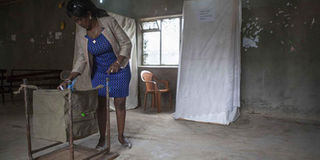Calm in Ethiopian capital after landmark elections

A voter casts her ballot at a polling station in Addis Ababa on May 24, 2015, during the Ethiopian first general elections since the death of strongman Meles Zenawi in 2012. AFP PHOTO | ZACHARIAS ABUBEKER
What you need to know:
- Conspicuously missing was the heavy security presence on the streets that characterised the election day.
- EPRDF and its allies won 99.6 per cent of the seats in the last round of elections in 2010
- The final election results will be announced by NEBE on June 22. NEBE is the only organisation that has the statutory right to announce the poll results.
ADDIS ABABA
The Ethiopian capital Addis Ababa was calm on Monday after the Sunday landmark elections.
Offices, shops and hotels and restaurants were open and people went about their businesses as usual.
The heavy tonnage trucks delivering material for the massive Addis Ababa construction industry could be seen criss-crossing the roads.
Conspicuously missing was the heavy security presence on the streets that characterised the election day.
Traffic flowed smoothly on most of the city roads.
Like was the case before the election, political talk was a no-go zone for the vast majority. Those who elected to talk politics mostly did so in whispers.
The Sunday General Election was Ethiopia’s first since the demise of Meles Zenawi, who died in office after 21 years in power.
Mr Meles’ successor Hailemariam Desalegn and the ruling party — the Ethiopian People’s Revolutionary Democracy Front (EPRDF)— are largely expected to win the elections with a landslide.
EPRDF and its allies won 99.6 per cent of the seats in the last round of elections in 2010.
VOTE COUNTING ONGOING
Vote counting was continuing and the preliminary results are expected to be announced by the National Electoral Board of Ethiopia (NEBE) on Friday.
The final election results will be announced by NEBE on June 22. NEBE is the only organisation that has the statutory right to announce the poll results.
Fifty-eight political parties contested the Sunday election, in which some 1,826 candidates were running for parliamentary seats. Another 3,993 candidates were gunning for regional council seats.
NEBE had registered 36.8 million voters, a record in the country’s history, but the voter turnout was yet to be declared.
The voters cast their ballots at a total of 45,000 polling stations across the vast country.
The campaign period was characterised by a calm, quite uncharacteristic of most African political contests.
A host of foreign observers, including the European Union and the US Carter Center were barred from the Ethiopian elections.
NEBE chief executive Nega Dufessa said the government did not deem the presence of some foreign observers as necessary.
“As is stated in the constitution, foreign observers are invited only when the government believes that having them is important,’’ Prof Dufessa said in an interview.
“The election board does not have the mandate to invite foreign observers. That task is left for the government and there will be foreign observers for this election such as the African Union team.”
CLEAN BILL OF HEALTH
The AU has so far given the conduct of the Ethiopian elections a clean bill of health.
NEBE is positive about the elections credibility, insisting that it started preparing for it soon after the 2010.
With some 89 million citizens, Ethiopia is the second most populous country in Africa after Nigeria. It is the seat of the African Union and is often applauded for its economic performance and military intervention against the militant group Al-Shabaab in neighbouring Somalia.
However, the intolerance by the government reigns supreme and mass poverty remains a major scar on the Ethiopian state. According to UNDP about 30 per cent of its citizens live below the poverty line.
Thousands of Ethiopians flee their motherland each year in search of freer societies with better living conditions and opportunities for prosperity.
Ethiopia ranks among the 10-most media unfriendly states globally. It shares the ignominy with its next door neighbour and former part of its territory Eritrea.




